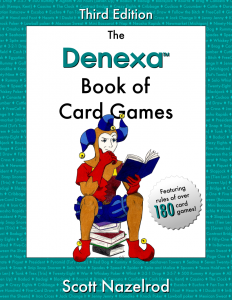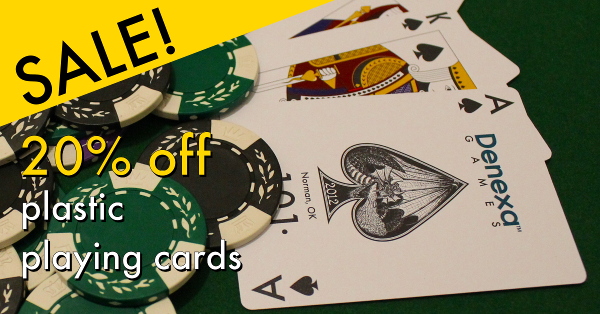Egyptian Ratscrew
Egyptian Ratscrew is something of a hybrid of War and Slapjack, for two or more players. Like Spoons, the physicality of the game makes it a potential source of injury if players get too exuberant. While there’s slightly more strategy in Egyptian Ratscrew than there is in War, there’s still not much, so this game is generally enjoyed most by those who aren’t yet old enough to drive a car.
Object of Egyptian Ratscrew
The object of Egyptian Ratscrew is to get all of the cards. All of them.
Setup
Egyptian Ratscrew features people smacking cards excitedly, so you need some sturdy cards. Fortunately, Denexa 100% Plastic Playing Cards fit the bill perfectly. Most games will be adequately served by one 52-card deck, but there’s no reason you can’t shuffle in a second one for larger games (and it doesn’t matter too much if the backs don’t match). Some players add one or more jokers to ensure the deck divides evenly between players.
There are many variations on the rules to Egyptian Ratscrew, so make sure everyone is on board with the particular set of rules being used.
Shuffle and deal out the cards one at a time, starting with the player at the dealer’s left, and continuing clockwise from there. Some people might end up with one more card than others, which is okay. Players may not look at their cards. Each player’s cards should be kept in a neat stack in front of them, face down.
Game play
The player to the dealer’s left goes first. They begin by flipping one card face up from their stack and playing it to the center of the table. Since the player would have an advantage if they turned the card up the normal way, since they would glimpse the card before anyone else, Egyptian Ratscrew convention is to grab the card from the far side and flip it up away from oneself. The next player to the left does the same, flipping a card face up and adding to the central pile, and so on.
Cards played out of turn remain on the pile, and are considered dead cards. Any effect their rank would have on game play is ignored. The player who played them must play again when it becomes their turn. In essence, they’re charged a fee of one card for playing out of turn.
Challenges
When a player reveals a face card or an ace, the next player after them is challenged. The challenged player must flip up a number of cards as a response, looking for another face card. A jack requires one card to be revealed in response, a queen two, a king three, and an ace four.
If the player successfully reveals a face card, the challenge passes to the player to their left. That player must turn over the number of cards required by the most-recently turned over face card. If they, too, reveal a face card, the challenge passes to the next player, and so on.
If a challenged player reveals all numeric cards, then the challenge is lost. Whoever was the most recent player to play a face card adds the entire pile of played cards to the bottom of their stack.
Should a player run out of cards mid-challenge, the next player to the left has the option to continue the challenge. If they do, they reveal the appropriate number cards minus those already revealed. They may also decline the challenge, awarding the stack to the player who played the most recent face card.
Slapping cards
Another opportunity to win the pile is when a pair is played consecutively. The first player to notice this and slap the pile is awarded the entire thing, which is added to their stack. If multiple players slap, the player whose hand is on the bottom (i.e. in direct contact with the pile) wins. Slaps preempt any challenge taking place at the time.
If jokers are used, jokers are also slappable. Some players add other slappable combinations, such as a sandwich (a pair separated by one card of another rank, like 7-4-7), or a sequence of three or more cards.
To prevent players from slapping everything, players who make unwarranted slaps must pay one penalty card to the pile. This penalty card is considered a dead card. It may also be helpful to require players to designate one hand as a card-flipping hand and the other for slapping, to allow everyone to be on the same footing when it comes to slaps.
Running out of cards
When a player runs out of cards, they are eliminated for the time being. They may slap in to the game, so long as there are two active players in the game, by slapping a valid card combination and winning the pile as per usual. This privilege is revoked if the player makes a false slap, permanently shutting them out of the game.
Game play continues until only two players are in the game, and one runs out of cards. The sole remaining player takes the pile, and thus becomes the winner.


